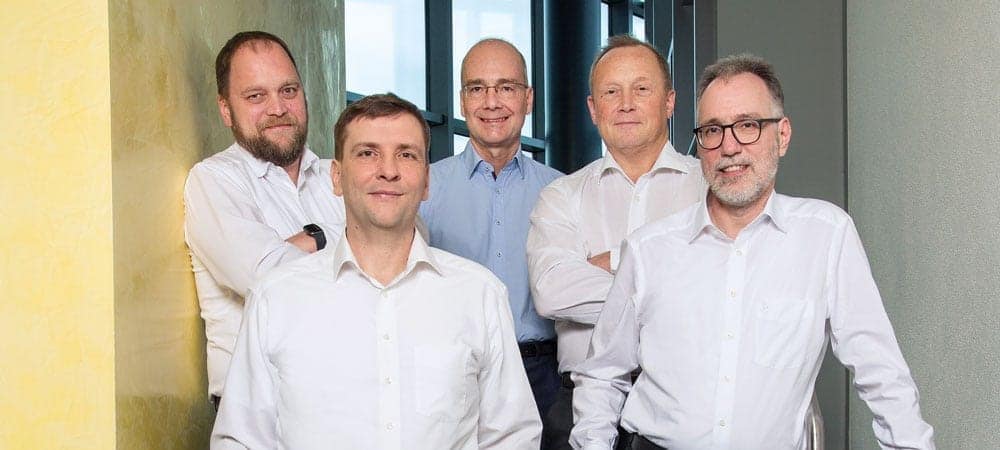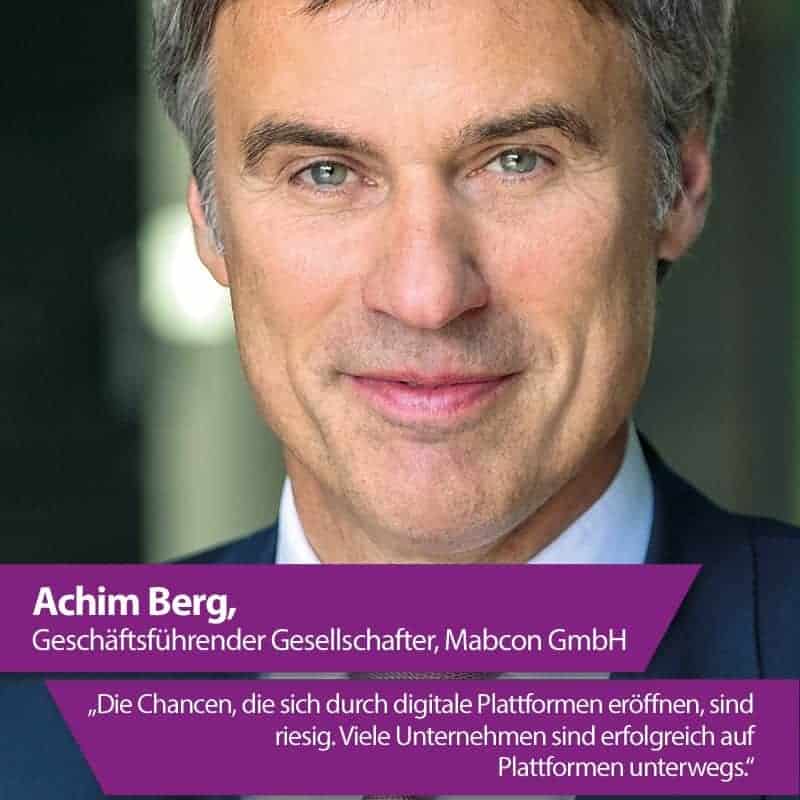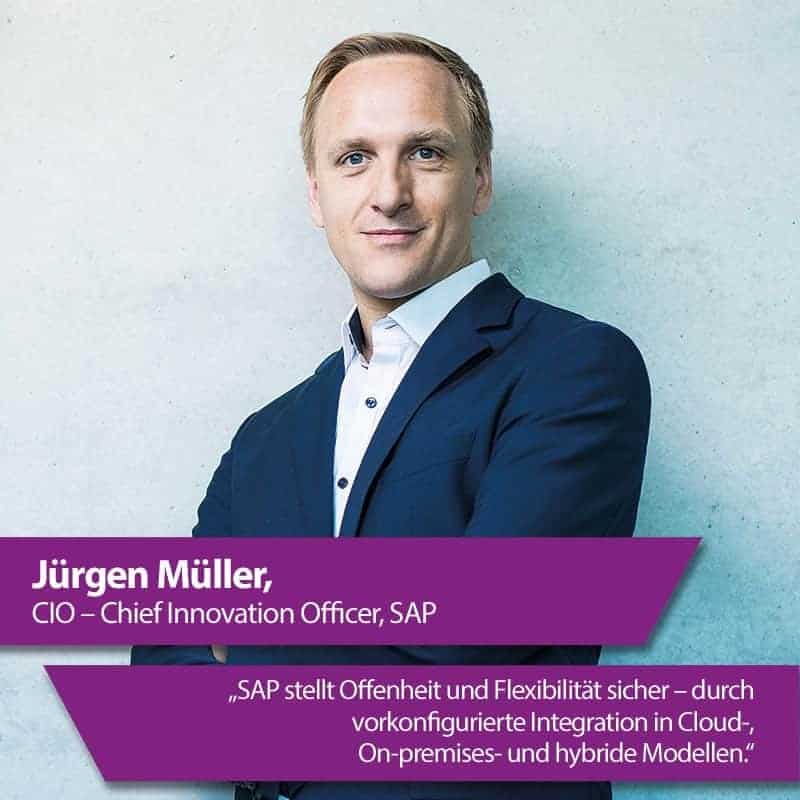Business Integration Suite


German industry is having a hard time with the digital platform economy. This is the result of a representative survey of 502 companies commissioned by the digital association Bitkom.
"When we think of digital platforms, we often first think of online retailers like Amazon or Ebay or service providers like Airbnb. For the traditionally strong German industry in particular, however, digital platforms offer huge potential for making our own business future-proof for the digital world."
says Bitkom President Achim Berg.
"With a view to Industry 4.0 and IoT, platform offerings are developing right now and markets are being distributed. When it comes to platforms, German industry should be at the forefront."
SAP partner Seeburger has seized the opportunity and developed an open platform for digital transformation under the name "Business Integration Suite".
"Digital transformation inevitably leads to a sharp increase in the programs and systems used"
knows Michael Kleeberg, Co-CEO at Seeburger. He describes the current situation:
"Monolithic architectures and solution approaches are being pushed into the background because of their inertia and inflexibility, and are being replaced by more flexible solutions that are best suited to the situation at hand.
Here, the trend is particularly toward cloud-ready or cloud-native approaches, as greater flexibility and speed are expected from the use of such solutions."
How quickly can new concepts and business processes be implemented? Are 1,000 man-days needed for a project, as is often mandatory in monolithic structures, or do "digital capabilities" enable the rapid implementation of new ideas?
Co-CEO Kleeberg knows that customers' ability to adapt to rapidly changing competitive conditions to defend their market leadership depends on the flexibility and speed of the underlying digital infrastructure.
Michael Kleeberg specifies:
"The attempt by some manufacturers to keep their customers in their own and closed ecosystems as far as possible is not expedient in our view. It is almost impossible for a single manufacturer to offer the best possible solution in all required areas.
Rather, open architectures are in the customer's interest. Our BIS platform provides a foundation to enable this flexibility and speed."
Thus, the reticence surveyed by Bitkom is surprising because CEOs in the industry see clear advantages of digital platforms.
Bitkom President Achim Berg:
"The opportunities presented by digital platforms are huge."
But only 16 percent of companies have multi-person teams responsible for digital platforms. Achim Berg:
"A company in which no one has digital platforms in mind has blind spots at crucial points. No company should simply ignore digital platforms."
SAP is also pursuing a specific, less open platform idea, although the strong integration with existing SAP products must be at the expense of open agility. In principle, however, SAP is pursuing a similar concept to Seeburger, even if the technical implementation is completely different.
"Our enterprise technology platform brings Hana and analytics capabilities closer together with SAP Cloud Platform so users can make more informed decisions"
explained Jürgen Müller, Chief Technology Officer and member of the SAP Executive Board, at TechEd last year in Barcelona.
"SAP ensures the highest levels of openness and flexibility - through out-of-the-box integration, a modular design, and easy extension across cloud, on-premises, and hybrid deployment models."

When people talk about platforms in connection with the digital transformation today, they usually mean so-called "digital platforms".
Matthias Feßenbecker, Chief Technology Officer at Seeburger, explains their purpose:
"From a technical perspective, the digital transformation is characterized by an extremely growing amount of data. These masses of data are supposed to provide the gold of the future, which has to be extracted and lifted out of the data."
Feßenbecker describes the current situation.
"The alchemists of the digital age need a lot of computing power for this task. Conventional IT systems and databases are not designed for this. So new solutions are needed - these are then the digital platforms."
The envisioned "digital collaboration" in the form of digital ecosystems also requires a technical foundation that has not existed in this form before.
"So digital platforms are not directly positioning themselves as a replacement for an ERP suite"
explains the Seeburger CTO.
"In addition, digital platforms tend to be offered as cloud services, which makes sense because they are resource-intensive and can't just be run and mastered on the side."
SAP itself is also trying to follow this path, albeit with a strong focus on its own applications and thus not as open and agile as Seeburger Business Integration Suite.
By bringing together SAP technology in a stack with a reference architecture, SAP's platform provides the services that modern businesses need.
It includes database and data management, application development and integration, analytics, intelligent technologies and services.
Michael Kleeberg, Co-CEO at Seeburger, in an E-3 conversation once again on the basic positioning of the Business Integration Suite:
"A platform should provide a uniform basis for the fulfillment of specific tasks. This means that a platform is always subject to a certain purpose limitation, depending on the tasks it is intended to support.
Platforms such as R/3 and S/4 are primarily used to support business tasks and functionalities such as FI, SD or MM.
Similarly, the purpose of an integration platform such as Seeburger BIS is to support integration tasks between systems, applications and processes in operation or to enable them in the first place.
This integration is one of the core tasks of digitization, because important business processes and functions are IT-supported or even inconceivable without IT support."
Bitkom has found that the importance of digital platforms will continue to grow in the future. Nine out of ten companies are convinced that digital platforms will be very important or rather important for both the global and the German economy in ten years' time.
"Companies have recognized that digital platforms are of growing importance and would like to see many more of them in Germany and Europe - but too few still want to deal with them in their own companies"
Berg said.
Digital platforms like Seeburger BIS are only partly a technical and organizational solution; equally, they are also a business challenge.
"From a financial decision maker's point of view, platforms are a great added value in times of increasing digitalization of business processes"
Axel Otto, Chief Financial Officer at Seeburger, describes the scenario.
"Whereas in the past our customers were usually only able to opt for a monolithic ERP system as a whole, as described earlier, platforms now offer the possibility of building up the system landscape required for the customer's business activities as if in a modular system. This also has an impact on our customers' investment costs as well as their running costs."
For some years now, a "democratization" has been observed in the SAP community and many existing customers are looking beyond the "SAP horizon". Seeburg CFO Axel Otto has this to say again:
"By using platforms, our customers can now combine solutions from different providers. They are able to choose which solution seems to be the most suitable for them when making a decision, and they can negotiate each chosen solution separately.
This gives them the opportunity to directly influence costs when making decisions. So it's also possible to first check what priority an issue has internally."
In many cases, however, the SAP community is still struggling to define the terms used in the numerous buzzwords and analyst recommendations. The Seeburger platform is called Business Integration Suite: What is the generic difference between platform and suite?
"Seeburger Business Integration Suite is the umbrella term for our complete solution offering"
explains Martin Kuntz, Chief Cloud Officer at Seeburger.

The BIS platform provides the technical basis for completing specific tasks and areas of responsibility.
"The added value of the suite comes from the content - be it in the form of pre-built industry solutions, processes, mappings or else the wreath of existing and directly usable specialist cloud services and SAP add-on solutions"
Kuntz defines the scope of BIS.
"This approach allows users of our Seeburger Business Integration Suite to easily add more content to their solutions at any time"
adds co-CEO Kleeberg.
Seeburger customers benefit from being able to map a wide variety of integration tasks on a single platform using content that is suitable for each task.
An existing SAP customer could argue that with SAP Business Suite 7 he already has a suite. Why add the Business Integration Suite now?
"After all, the term suite alone says nothing about its content"
explains CEO and CTO Matthias Feßenbecker.
"Seeburger Business Integration Suite provides solutions for 'business integration,' specifically targeting the integration of business data and its associated applications and business partners."
SAP Business Suite 7, on the other hand, offers ERP, CRM, and SCM functionality, but not integration of the business data contained in these applications with business partners or non-SAP applications and cloud services - an oft-heard criticism of SAP from existing customers.
This means that the SAP and Seeburger suites complement each other in functional terms. Chief Cloud Officer Martin Kuntz adds:
"You could even put it this way: The topic of integrating products from other manufacturers is not exactly a focus for SAP."
Specialized tools are best suited for their specific tasks in each case, and co-CEO Kleeberg says:
"When you're faced with integration tasks, it makes more sense to look at integration platforms rather than painstakingly trying to cover the same functionality with tools that were never, or only marginally, intended for such applications. Of course, you can also heat a soup with a blowtorch."
An ongoing discussion in the IT scene is the challenge of breadth and holism versus depth and specialization. The Seeburger Business Integration Suite is characterized by high flexibility and breadth: Is this to the detriment of a necessary process depth?
"No, we have the necessary process depth, in fact that is an important point that differentiates us in the market"
Axel Haas, Co-CEO at Seeburger, emphasizes.
His co-CEO colleague Michael Kleeberg adds:
"Last but not least, we offer special process depth through our in-depth industry know-how in retail, automotive, FSI and more.
Our customers can obtain ready-made solutions, i.e. content, from us for the process-specific integration challenges of their industries, which can be used immediately out of the box."
In the German-speaking SAP community, there is an intense discourse about whether the future will now take place in the cloud or remain on-premises. This naturally also raises the question:
Is Seeburger Business Integration Suite an on-premises or cloud solution?
And what do Seeburger's board members think SAP's existing customers currently prefer? Co-CEO Michael Kleeberg:
"The Seeburger Business Integration Suite is both. The software can be purchased as a classic software license with a maintenance contract or as a software subscription for on-premises operation. Alternatively, the Business Integration Suite can also be booked as a cloud service."
The customer can choose the service level between iPaaS - Seeburger operates and maintains the software - and Full Managed Service - Seeburger takes over all tasks up to daily monitoring and change management.
"Many SAP customers are among them. Among major customers worldwide, there is a trend towards operating with public cloud providers such as AWS or Microsoft Azure. This is the 'new' on-premises model. Seeburger offers its full service portfolio in this case as well."
defines Michael Kleeberg. And fellow board member Axel Otto adds in conversation:
"In fact, our cloud business is developing very positively. We have grown in this segment by more than 20 percent per annum in each of the past few years."
Finally, the question of positioning to the Seeburger board members: How do analysts and existing SAP customers react to the suite and platform offerings of a medium-sized system house like Seeburger versus the offerings of hyperscalers AWS, Google, Alibaba, Microsoft or software vendors like SAP, Oracle and IBM?
"For us, both the aforementioned hyperscalers and the well-known large SW vendors are in fact not competitors, but often partners"
defines Co-CEO Axel Haas.
"The hyperscalers, for example, offer IaaS - Infrastructure as a Service. The Seeburger BIS platform can also be optionally operated by our customers in such an IaaS cloud. If desired, even with 24/7 management of the BIS."
This makes particular sense for customers who have also outsourced their ERP landscape to such a hyperscaler. And Axel Haas adds:
"We also have partnerships with the aforementioned SW providers, as we complement each other well. This applies in particular to SAP, with which we have enjoyed good, complementary cooperation for decades.
SAP's offerings are focused on applications for digitization - and we're supporting on the integration side."
Board colleague and co-CEO Michael Kleeberg specifies:
"The Seeburger Business Integration Suite offers a much greater process depth for specific integration requirements than the established generic offerings from hyperscalers.
With the Business Integration Suite, our customers can access pre-built integration solutions - content - for their specific industry requirements."
And how do Seeburger customers react in concrete terms?
"They appreciate the way we work with them as partners."
CTO Matthias Feßenbecker knows from numerous BIS implementations.
"Incidentally, this does not only apply to our customers from the SME sector. It also applies in particular to our customers from the enterprise sector. With which hyperscaler does a customer have the opportunity to discuss their own requirements and challenges directly with the board and management?"
His colleague on the board and Chief Cloud Officer Martin Kuntz adds:
"This is where Seeburger's size, with just over 1,000 employees, definitely proves to be an advantage.
On the one hand, this enables us to be agile and, on the other hand, we are focused on the topic of integration in this way. We are able to offer a broad, comprehensive functional spectrum with our BIS platform.
SAP's existing customers as well as analysts therefore value us as specialists - as impressively demonstrated, for example, by our listing in the Gartner Magic Quadrant."
CFO Axel Otto concludes:
"Over the past years, we have managed to position ourselves successfully in the market. We have been active for more than 30 years and more than 10,000 customers trust in our solutions.
We exceeded the 1000-employee mark for the first time at the end of 2019. What sets us apart is our reliability and our partnership approach to our customers.
Many of our customers have placed their trust in us for many years. We only sell solutions where we are 100 percent convinced that we can realize the service offered. That is very important to us."
Thank you to all Seeburger board members for talking with us.







